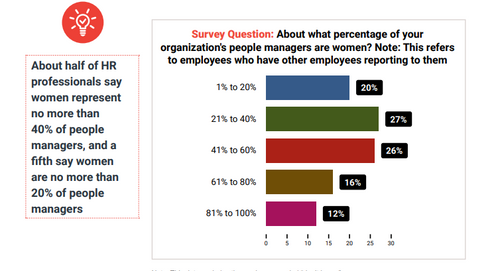
“The Future of Diversity, Equity and Inclusion,” conducted by The HR Research Institute, reveals that most diversity, equity, and inclusion (DEI) programs remain undeveloped, despite the fact that building DEI initiatives is shown to foster stronger employee relationships and increase financial performance. A mere 9% of respondents rate their organization's DEI initiatives as being highly effective. Organizations with successful DEI programs put in the time to comprehensively define and prioritize them, and they have the support of top management.
“It is a hard hill to climb and to get leaders to understand the importance of diversity, equity and inclusion in an organization and how that does drive business operations and business decisions. You say you want to look like the communities in which you serve, but do you really? And it's really taking a step back and looking at it and saying we just got to do better,” says Billie Wright VP of People Operations, Nava, who serves on HR Research Institute’s The Future of Diversity, Equity and Inclusion 2022 advisory board.
Other major findings include:
● Companies struggle to fully develop their DEI programs. Only about 22% indicate that DEI initiatives in organizations have reached the “expert” or “advanced” stages of the HR Research Institute’s DEI maturity model. Although most organizations are having trouble effectively managing DEI, more than 44% say that DEI plays a role in strategic planning, and another 32% integrate their DEI frameworks into the business strategy.
● Less than half (48%) agree that pay is equitable in their organization and most are not investing in understanding gaps. Just 9% say equitable pay is a top priority among executives, while 28% say that equitable pay is not currently an organizational priority at all. Only 30% say they are actively investing in understanding the pay equity gap in their business while 14% say they don’t measure pay or pay equity at all.
● Most companies underutilize DEI metrics and training. Those that do measure their current state of DEI most rely on basic compliance-oriented workforce data (56%). Only 40% offer DEI-related learning and development to all employees. The most common program is unconscious bias training (69%).
● Progress has been made in cultivating a more diverse workforce, but many companies still have a long way to go. Nearly half (48%) agree their workforce is more diverse than it was two years ago, but more than half (57%) say ethnic/racial minorities make up no more than one-fifth of their organizations’ leaders, and 20% say the same about women.
● Companies are often not implementing benefit programs that appeal to a diverse workforce. While 70% offer flexible work options, fewer offer paid parental leave (58%), benefits for domestic partners (43%) and family building benefits (23%) and 18% only provide the benefits mandated by law.
● Organizations with strong DEI practices are more likely to: consider a wider range of characteristics in their scope of DEI, integrate DEI strategic frameworks into their business strategies, emphasize DEI in talent acquisition and employee communications, have programs to improve diversity in the leadership ranks and an array of training and metrics.
"DEI has become a top concern over the last two years, but organizations can't get to DEI success overnight. In fact, we found that only about a fifth of HR professionals say that DEI initiatives in their organizations have reached the “expert” or "advanced” stages of HR.com's DEI maturity model,” says Debbie McGrath, CEO, HR.com. “So, we still have a long way to go. The good news is a lot more HR departments are prioritizing this and seeking out best practices so their organizations can boost diversity, equity and inclusion as quickly as possible."
The full report of "The Future of Diversity, Equity, and Inclusion" can be downloaded here.
About the Survey
The “Future of Diversity, Equity and Inclusion 2022” survey ran in January and February 2022. We gathered 367 usable complete and partial responses from HR professionals in virtually every industry vertical. Respondents are from all over the world, with the majority from North America, especially the United States. The participants represent a broad cross-section of employers by number of employees, ranging from small businesses with fewer than 50 employees to enterprises with 20,000+ employees. More than half of respondents are from organizations with 250 or more employees.
About HR.com and the HR Research Institute
HR.com’s HR Research Institute helps HR departments keep their finger on the pulse of HR! HR.com is committed to creating inspired and informed workforces by maximizing the potential of HR professionals around the world. Almost 2 million HR professionals rely on HR.com as the foremost, trusted industry resource for education, career development, and compliance (that many people can’t be wrong!). Offerings include the largest network of HR executives, leading-edge industry research from the HR Research Institute, 13 monthly HR-themed epublications, innovative HR education including 250+ annual webcasts, the most comprehensive HR certification exam preparation program supporting SHRM and HRCI certification, as well as helpful HR tools and legal compliance updates. HR.com has the largest knowledge base of HR practices globally and offers unparalleled training and networking for HR professionals all over the world... 24/7… 365 (just in case you can’t get enough HR). Visit www.hr.com/hrresearchinstitute to download research (always free) and to maximize HR potential.

This press release is distributed by the Newsworthy.ai™ Press Release Newswire - News at the speed of influence™. Reference URL for this press release is here.

